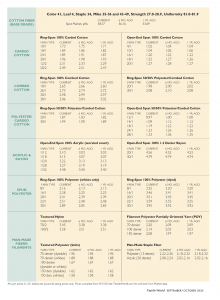 By Jim Phillips, Yarn Market Editor
By Jim Phillips, Yarn Market Editor
It is no secret that those U.S. yarn manufacturers and fabric makers that have the capability to produce personal protective equipment (PPE) have weathered the COVID-19 pandemic better than many others in the textile industry.
Many companies came together and focused on producing face masks, isolation gowns and other medical textiles to help keep front-line healthcare workers, emergency responders and other essential personnel safe.
The problem is, however, that overall U.S. PPE production capacity trails behind some other countries and falls well short of meeting domestics needs. “It is not good when, in a time of national crisis, we have to rely on companies in China and other nations to provide us with critical life-saving apparel and accessories,” said a well-placed industry analyst. “We must learn a valuable lesson from the current pandemic and prepare not to be caught short again.”
To that end, the National Council of Textile Organizations (NCTO) recently launched a paid social media video campaign that highlights the extraordinary efforts the industry has taken to respond to the PPE shortages.
“NCTO is launching a social media and email campaign today to show members of Congress how this industry has significantly contributed to the nation’s PPE crisis, while demonstrating the importance of immediate policies and legislation, such as Buy American mandates, to establish a sustainable domestic supply chain for the future,” said NCTO President and CEO Kim Glas.
“Our campaign underscores the importance of ending our overreliance on China for PPE and calls on Congress to craft policies that support domestic procurement requirements and the onshoring of jobs,” Glas added. “It is high time we had a national strategic plan in place to spur investment in the industry and ensure our country has a permanent domestic PPE supply chain to confront the next pandemic our country faces.”
Accordingly, NCTO has recommended Congress enact several policies that support the production of PPE in the United States through a long-term domestic supply chain:
- Create strong domestic procurement rules for federal PPE purchases substantially similar to the Berry Amendment and the Kissell Amendment. The Berry and Kissell Amendments require the U.S. Department of Defense and Homeland Security to purchase American-made textile products for certain applications.
- Implement forward-looking policies to shore up the Strategic National Stockpile and to identify, incentivize, and maintain a robust domestic supply chain for PPE and medical supplies.
- Create federal incentives for private sector purchases of domestically produced PPE.
- Provide funding assistance for companies to reconstitute domestic PPE supply chains.
- Strengthen the Berry Amendment.
Several manufacturers and institutions have already begun exploring how to increase U.S. PPE production. For example, Gaston College’s Textile Technology Center (TTC)
is partnering with others in the community to create a launch pad for prototyping and testing reusable PPE products for entrepreneurs and existing manufacturers. The project has been funded by the North Carolina Legislature.
More than $5 million will be allocated to Gaston County to construct an Incubator and Extrusion Center for Advanced Fibers for Gaston College’s TTC. “I’m excited about this new initiative and the building of a new fiber innovation center,” said Dr. John Hauser, president of Gaston College. “Now we have an opportunity to expand our expertise to produce high-quality products to benefit our communities.”
Achieving Greater Productivity, Profitability
While COVID-19 issues still dominate the news, U.S. fiber/yarn/fabric makers continue to seek innovative ways to increase efficiency and productivity. A recent example is the introduction by Cotton Council International of a technical consultancy program that helps mills and manufacturers achieve greater productivity, process efficiency and, ultimately, profit for their businesses.
The program is called Cotton USA Solutions™ and is designed to help enable mills and manufacturers to optimize the use of U.S. cotton with cutting-edge offerings to profitably transform their businesses.
September/October 2020





